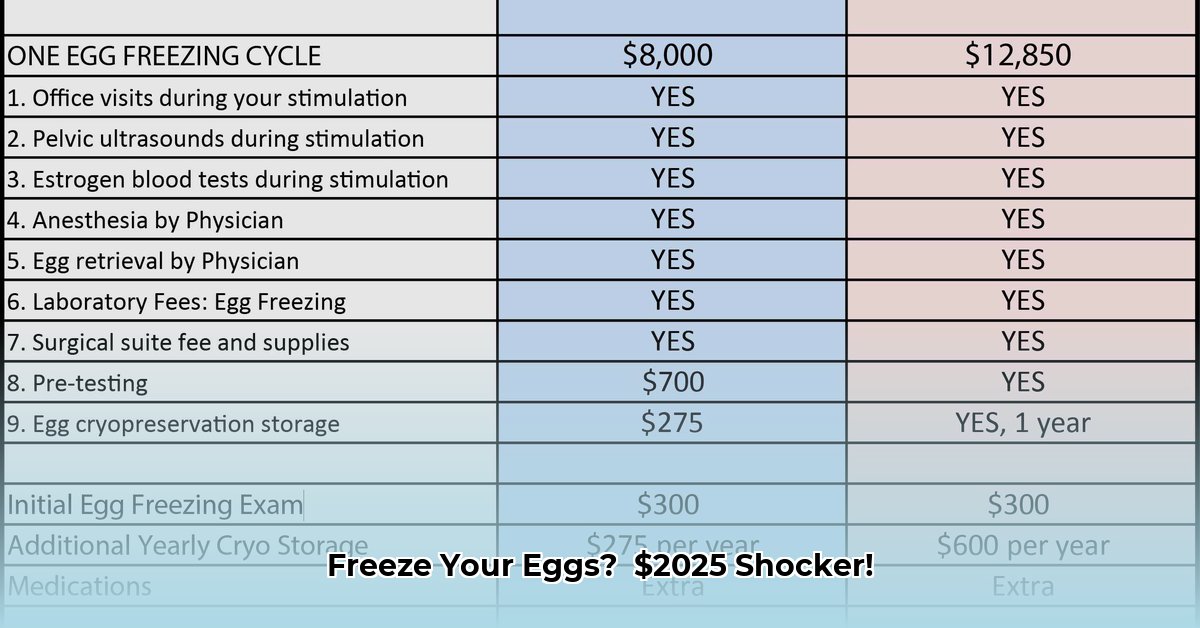Thinking about freezing your eggs? It’s a significant decision, and the cost is a major factor. This guide breaks down what impacts the price, ways to find affordable options, insurance considerations, and resources for support. We’ll help you confidently navigate the egg-freezing process. For more information on egg health, check out this helpful resource on egg supplements.
Freezing Eggs Cost: A 2025 Guide to Navigating the Financial Landscape
Freezing your eggs is a big decision, both personally and financially. This guide helps you understand the costs involved and empowers you to make an informed choice about your fertility and family planning. Let’s explore the landscape of egg freezing expenses and fertility preservation options.
Decoding the Factors Influencing the Price Tag of Egg Freezing
Several factors play a role in determining the final price of oocyte cryopreservation.
- Location: Clinics in major metropolitan areas often have higher costs due to increased overhead and demand. Consider clinics in suburban or smaller cities for potentially lower prices.
- Clinic Reputation and Technology: Established clinics with advanced technologies may charge more for their perceived expertise and cutting-edge equipment. Research clinic success rates and doctor qualifications to ensure you’re getting value for your money.
- Medication Protocol: The specific medications and dosages required to stimulate egg production can vary significantly between individuals. Your doctor will tailor a protocol based on your ovarian reserve and response to medication which will change the price.
- Number of Cycles: The number of egg retrieval cycles needed to achieve your desired number of eggs will directly impact the overall cost. This is influenced by your age, ovarian reserve, and response to stimulation medications.
- Cryostorage Fees: Annual storage fees for cryopreserved eggs can accumulate over time. Inquire about long-term storage options and potential discounts for multi-year contracts.
- Anesthesia: The type of anesthesia used during the egg retrieval procedure (local vs. general) can influence the overall cost. Discuss the options with your doctor and understand the associated fees.
- Monitoring: The frequency and type of monitoring appointments (ultrasounds, bloodwork) during the stimulation phase can affect the overall price.
- Services Included: Understand whether the quoted price includes consultations, pre-screening tests, and other ancillary services.
Decoding the Cost Ranges: Understanding the Numbers
Providing a precise cost for egg freezing is difficult because it varies so much. However, a single cycle of egg freezing might range from $5,000 to $20,000, or even more, depending on the factors we discussed. This typically includes:
- Consultation Fees: $250 – $500
- Testing and Screening: $500 – $2,000 (includes blood work, ultrasounds, and ovarian reserve testing)
- Medications: $3,000 – $6,000
- Egg Retrieval Procedure: $1,500 – $3,000
- Cryopreservation and Initial Storage: $500 – $1,000
- Annual Storage Fees: $300 – $800
Many women need more than one cycle, meaning the total cost quickly adds up. Remember, these costs only cover the freezing process itself. If you later decide to use your frozen eggs and need IVF, expect to add a significant amount of money to the total bill. This fertility treatment can become costly.
Smart Strategies for Managing the Costs of Egg Freezing
Facing a large bill for egg freezing can be really stressful. Let’s explore ways to manage these costs more effectively.
- Payment Plans and Financing Options: Many clinics offer payment plans, allowing you to spread the cost over time. Some also partner with fertility financing companies that specialize in providing loans for fertility treatments.
- Compare Clinic Pricing: Shop around and compare prices from multiple clinics; there’s often a surprisingly wide range. Don’t hesitate to ask clinics to match or beat competitor pricing.
- Insurance Coverage: Check your policy carefully; many insurance plans only cover egg freezing in specific situations, such as cancer treatment. State regulations regarding egg freezing coverage also vary considerably.
- Fertility Grants and Scholarships: Explore fertility grant programs and scholarships offered by organizations like the Cade Foundation, the Baby Quest Foundation, and Fertility for Colored Girls.
- Employer Benefits: Some employers are starting to offer fertility benefits as part of their employee healthcare plans. Check with your HR department to see if your employer offers any coverage for egg freezing.
- Discount Programs: Ask clinics about any discount programs they may offer, such as discounts for military personnel, teachers, or first responders.
- Multi-Cycle Packages: If you anticipate needing multiple egg freezing cycles, inquire about multi-cycle packages, which can often offer a discounted rate compared to paying for each cycle individually.
The Emotional Rollercoaster: It’s More Than Just Money
The financial pressures aren’t the only stress to consider. Physically and emotionally, the egg freezing process is demanding. Hormone fluctuations during the treatment can impact your mood, and the financial burden can add to this emotional strain. Remember that seeking support from friends, family, support groups, or counseling is incredibly important during this time. Don’t hesitate to reach out for help. Approximately 30% of women undergoing fertility treatments report symptoms of depression or anxiety. Support groups like the National Infertility Association (RESOLVE) offer valuable resources and a sense of community.
Age, Success Rates, and Your Egg Freezing Journey
Your age plays a big role in the oocyte preservation success rate. The American Society for Reproductive Medicine (ASRM) states that women who freeze their eggs in their early to mid-30s have a significantly higher chance of success than women who freeze their eggs later in life. Younger women generally need fewer cycles, reducing the overall cost. As women get older, the number of cycles often increases, leading to higher expenses and a slightly lower chance of a successful pregnancy later on. It’s essential to have a clear understanding of these probabilities before making your decision. Ongoing research continues to refine the understanding of these correlations and fertility options.
| Age at Freezing | Estimated Live Birth Rate per Egg Thawed |
|---|---|
| Under 35 | 50-70% |
| 35-37 | 40-60% |
| 38-40 | 30-50% |
| Over 40 | Less than 30% |
A Step-by-Step Guide to Navigating Egg Freezing
Here’s a practical roadmap to help you navigate the process. Each step is crucial in fertility preservation.
- Thorough Research: Start by doing your homework. Research different clinics, comparing their techniques, success rates (check SART data), and pricing structures. Look for clinics with a good reputation and transparency in their pricing.
- Initial Consultations: Schedule consultations with several clinics. Discuss your individual needs and obtain personalized cost estimates. Ask questions! This is your chance to understand their approach to egg freezing.
- Detailed Cost Breakdown: Before committing to a clinic, get a complete, itemized price list. Make sure you understand every charge. Don’t hesitate to ask for clarification on anything that’s unclear.
- Procedure Understanding: Ensure you fully understand every step of the egg freezing procedure, including the potential risks and benefits. Ask about any potential complications and how the clinic handles them.
- Financial Counseling: Consider seeking guidance from a financial advisor who specializes in family planning. They can help you assess your financial situation and develop a plan to afford egg freezing.
- Emotional Preparation: Prepare yourself emotionally for the demanding nature of the egg freezing process. Enlist the support of friends, family, or a therapist to help you cope with the stress and uncertainty.
- Ask Questions: Don’t be shy about asking questions. This is a significant decision, so ensure all your questions are answered to your satisfaction. Clarify anything you’re unsure about, regarding the procedure, the costs, or potential outcomes.
Looking Ahead: Resources and Further Information
While this guide provides a solid overview, numerous resources can offer further information about assisted reproductive technology. The American Society for Reproductive Medicine (ASRM) and the Mayo Clinic are excellent places to start your research. Patient review sites can also give insights into individual clinic experiences. RESOLVE: The National Infertility Association provides support and resources for individuals exploring fertility preservation options. Remember, this is a personal journey; proceed with confidence in your decision regarding future fertility.
Remember, the decision to freeze your eggs is deeply personal. This guide aims to demystify the financial and emotional aspects, empowering you to make a choice that feels right for you, financially and emotionally.
How to Negotiate Lower Egg Freezing Costs at Different Fertility Clinics
Key Takeaways:
- Egg freezing costs vary significantly based on the clinic, so negotiation is key for family building.
- Researching multiple clinics is essential for finding competitive pricing and affordable fertility.
- Negotiation strategies include exploring payment plans, financing options, and grant opportunities for fertility preservation.
- Insurance coverage varies widely; check your plan and state regulations for assisted reproductive technology.
- Emotional well-being is crucial; seek support when needed during fertility treatments.
- Age significantly impacts success rates; this should inform your decision-
- The TM Book Offers an Essential Guide to Meditation. - March 4, 2026
- Transcendental Meditation Books Guiding Your Journey to Deeper Practice - March 3, 2026
- Your TM Meditation Book Explores Its Benefits and History - March 2, 2026















